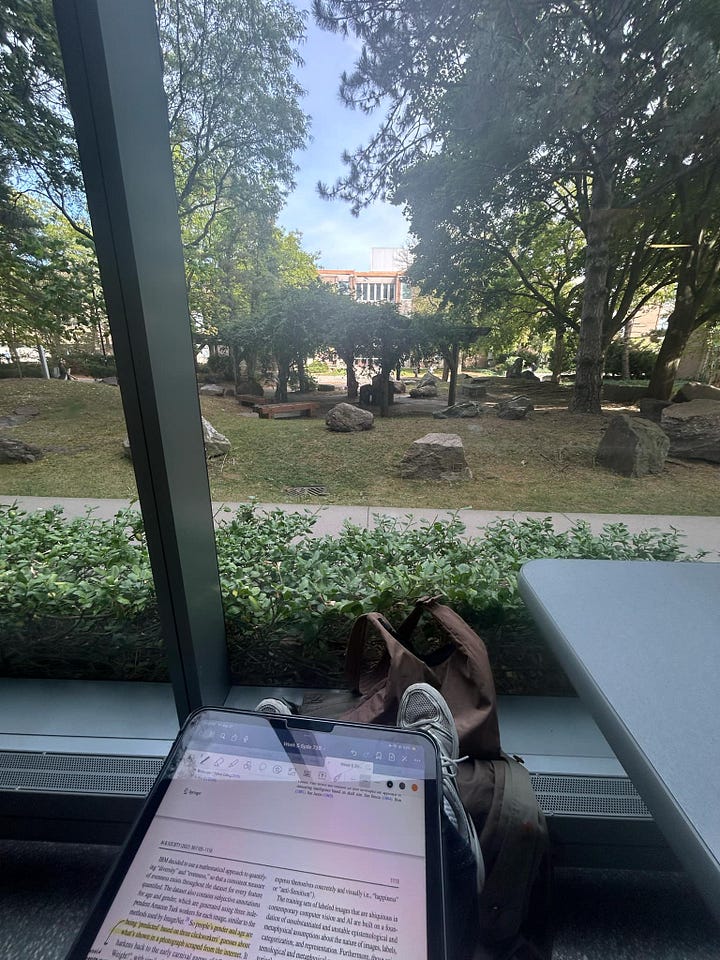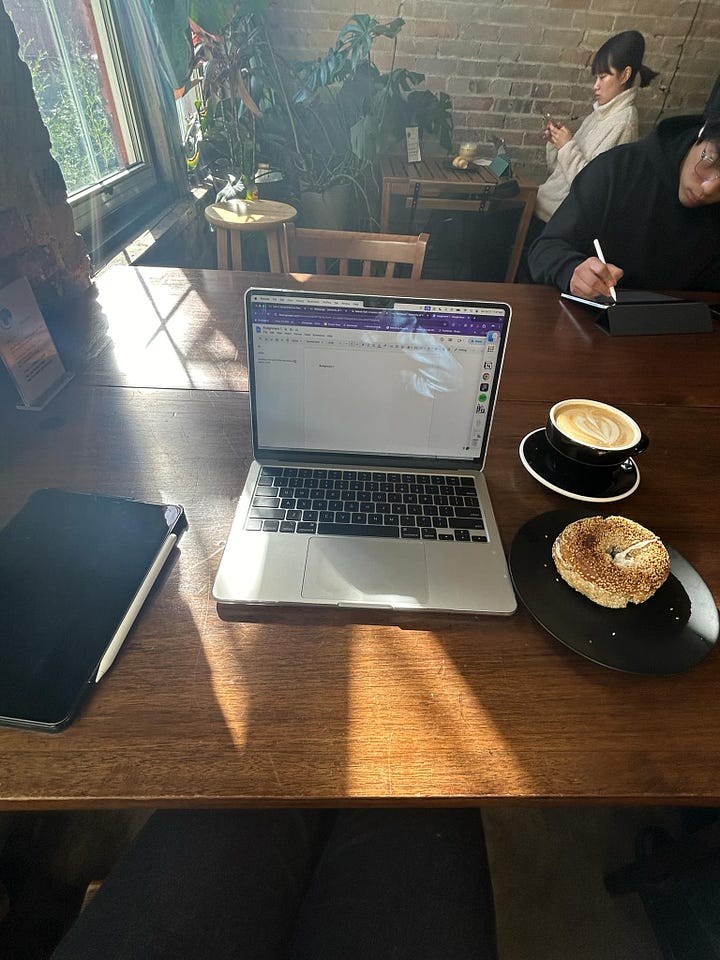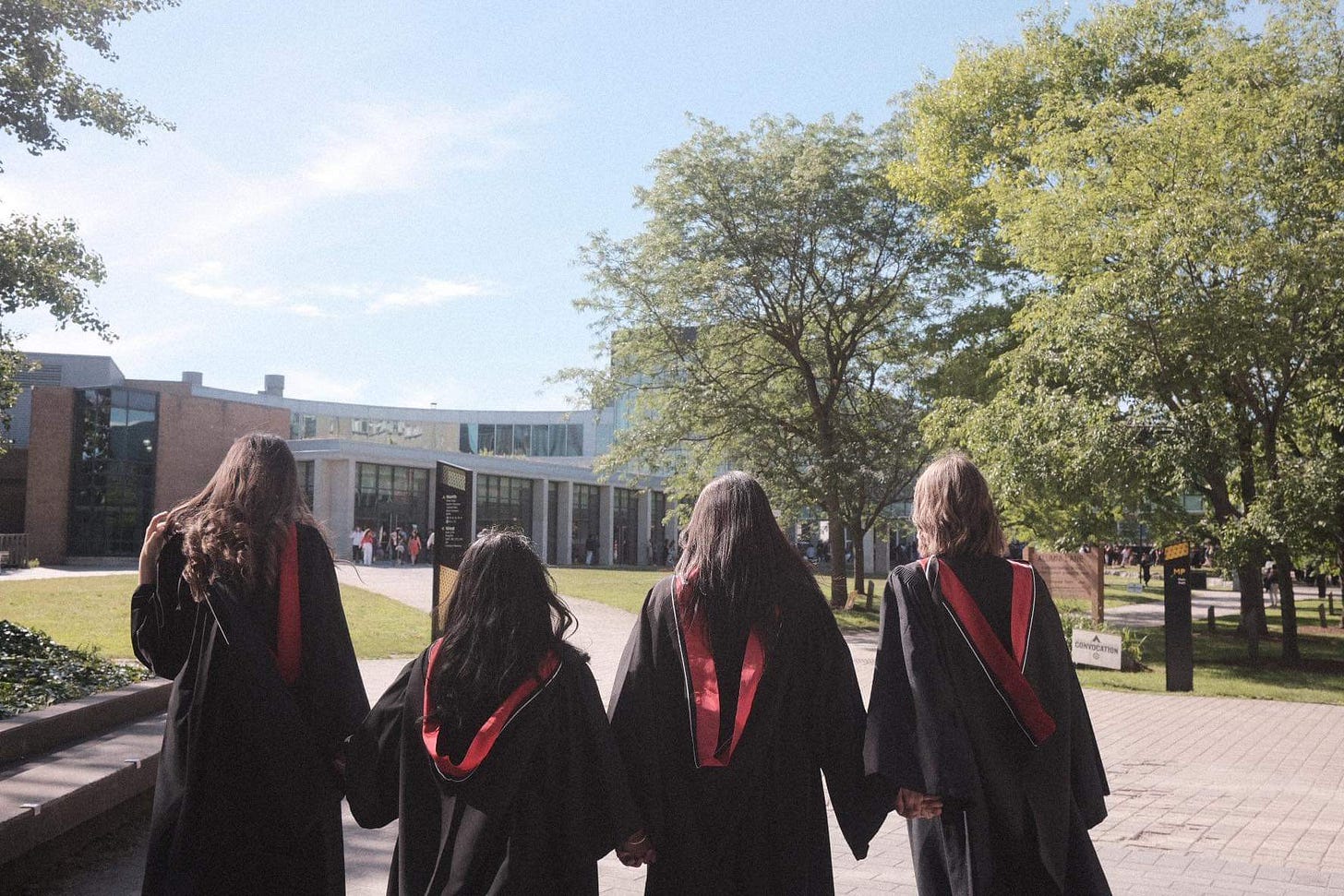Reflections on being 1/3 of a master
Completing the first semester of my Masters of Engineering at Waterloo
This past September, I started my Masters of Engineering at the University of Waterloo. After completing my first semester, I wanted to share some learnings from the past few months.
I completed my undergraduate degree at the University of Waterloo studying Systems Design Engineering (SYDE) in April 20241. The program blends traditional engineering courses, such as physics and calculus, with design-focused courses each semester. It was a highly technical degree, and we learned about all kinds of engineering - from designing in SolidWorks to building robots with Arduino or coding linear systems in Matlab.
The running joke was that we were ‘jack of all trades, master of none’ (which was not a lie).
I had spent my senior year navigating full-time and internship recruitment and only applied to 1 Master’s program (Waterloo’s, in the same faculty that I had spent my undergrad). I expected the program to be identical to the undergraduate version (a program I deeply enjoyed) but was surprised at how the Master’s program was run by this faculty.
At Waterloo, undergraduates often take 5-6 courses per semester. For a MEng student, you’re capped at 3 courses each semester. However, you have more flexibility than ever before (6 of your 8 courses are electives in a SYDE MEng). With a background in product design, I wanted this degree to be as design-focused as possible while still being an engineering degree and thus, I chose the following 3 courses:
SYDE 730: Artificial Intelligence and Society
This course dove into research papers, case studies, and books each week related to AI - considering how it impacts society. We reviewed theories by prominent academics like Foucault and Hughes, learning about concepts like social shaping and technological determinism. This was an avenue of engineering that I hadn’t been able to explore in undergrad, and feels like the true intersection of society and technology.
Interesting learnings from this course:
I learned about research around Waterloo on racial bias in facial recognition technology and discussed novels like Kashmir Hill’s “Your Face Belongs to Us.” I met professors who researched if ChatGPT is a conscious being, or how collecting a user’s data affects the environment - questions I hadn’t put much thought into prior (p.s: I save most of these articles via curius: https://curius.app/shaahana-naufal).
This course had students across philosophy, English, and engineering faculties meaning that every discussion had an interdisciplinary perspective. I’d learn about the research they conduct, books they’ve read in their classes, and learn how to share technical content for a non-technical audience.
How to critically think about everything I read, and question the impact of the technology I use (both the positive and the negative).
SYDE 640: Experimental Design
In this course, I learned how to conduct research studies and analyse them through statistical methods, and conducting a small-scale research study on multitasking.
When reading research papers for the first time, I found that the most difficult aspect to understand was the statistical analyses. While we took courses in undergrad related to statistics, we generally stopped at identifying dependent variables and Type I/Type II errors. This course dove deeper into various research techniques such as ANOVA tests, linear regression, t-tests etc. and reviewed how these were used in research papers across industries. We also had the chance to conduct a small-scale research study on multitasking, learn how to recruit participants, conduct a study, and analyze the results using various tools and techniques.
SYDE 600: Systems Theory, Models, Research & Design
I learned about user research methods such as observational research, contextual inquiry, and participatory design. This is a core course for all students in the program and is part of a set of courses where this one is focused on the research phase, and the second is focused on the building phase.
This course was designed to be an introductory course for those without experience in design or the SYDE faculty. I’ve taken courses such as User Research Methods and Cognitive Ergonomics throughout my undergrad so felt that the information was repetitive. As a project-based course, however, I worked with a team of 4 MEng students throughout the term and this course functioned as a way to meet those who I’ll be learning with over the next year.
Some additional thoughts from this first semester:
Academia can be slow, and things are sometimes taught for the sake of ‘rigour.’ In SYDE, many classes are project-based. After completing 7 internships now, the slower pace of some design courses results in feeling bored. In one of my classes this semester, I had asked the professor why we needed to complete a specific research technique despite it not being relevant to the project we were building and his answer was purely because it was rigorous and required for the course (which isn’t in my opinion the best way to design). This was part of why I chose to remain in engineering for post-grad as opposed to a product design-focused program as well - as most of the ones in Canada are designed for those who have not been exposed to design before (more beginner-focused).
Statistics isn’t as scary as I thought it was - like coding, it takes a mental shift but once you go through the shift and figure it out, you’ll understand it easily. Seeing how it can be applied in the real world, whether it be through research papers or your own experiments also helps.
Post-graduate is about depth, while undergraduate is about breadth. I was wrapping up an internship in SF and finally moved into Waterloo after skipping the first month of the semester and still, felt bored. There wasn’t enough work to do, and after being so used to overloading and taking double the courses- taking 3 wasn’t enough to keep me busy. I’m not sure that I’m a person who prefers depth in my academic learning (or after spending the last 5 years focused on completing tasks on a checklist, a model of depth feels unnatural).
While forming casual friendships is easy, developing close friendships is difficult and is best done 1:1. I went into this Master’s program knowing very few people at Waterloo. I had to put myself out there the way I did in my first year of university. While I was able to develop a few friendships, developing closeness in the same way you do through the first-year engineering struggles (3 am nights, studying with roommates, etc) proved to be harder than I expected. In SYDE’s undergrad program, you’re in a cohort of 100 people who follow you from class to class for 5 years. Simply by proximity, you develop close relationships and are likelier to find those you click with. My graduate classes averaged 10-20 people in a room, and when the degree is only 1 year, there’s less incentive to develop these relationships.
Unlocking a new genre of written content. Being able to read through and understand research papers, has opened up an entire genre of content that felt inaccessible before. I can understand technical concepts, I know where to find research papers and how to parse information quicker than I ever have.
Stretching a different muscle despite remaining in the same faculty and program. I spend most of my days writing papers, reading about research, or conducting experimental studies and statistical analyses on it. Rarely do I open my notebook to write down linear algebra formulas or spend days wrapping my head around proofs. This is a completely different way of learning, and while it took some adjustment, I feel that the information I’ve learned will stay with me (while many of the engineering courses are kept in a part of my brain that I haven’t accessed since I finished the exam).
Research vs course-based graduate programs: I chose a 12-month, course-based Master’s program instead of a research-based program. I decided I’d apply for a Master’s 2 weeks before the deadline so I didn’t have time to network with professors and find a research area that aligned with my interests (I also wasn’t ready to commit another 2 years of my life to school so opted for something shorter). At Waterloo, you can conduct research as an undergraduate and graduate student in 4-month intervals - so I’m considering working as a research assistant for a semester to still learn about research while being able to finish my degree within the year!




I never intended to MEng (see: https://shaahana.substack.com/p/choosing-from-the-fig-tree) but this first semester has been an exercise in trying new things - trading breadth for depth, making new friends, and turning my engineering degree into a design one. I’m excited for the next few months and a Waterloo winter where I’ll frequent Waterloo’s many coffee shops, the figure skating rink, and E7 for MEng 1B <3
https://uwaterloo.ca/systems-design-engineering/

